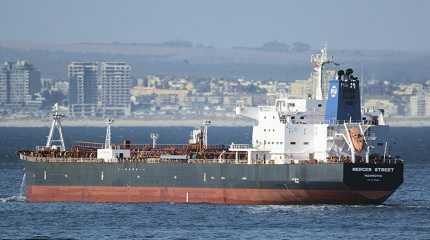
ATHENS, July 2 (Reuters) - An Iranian-flagged tanker seized by Greece in April, part of whose cargo was confiscated by the United States, was being towed to the port of Piraeus on Saturday, Greek coast guard officials said, after Greek authorities approved its release.
For over two months the Iranian-flagged Lana has been anchored off the Greek island of Evia in a diplomatic impasse which strained Athens' relations with Tehran amid growing tensions between Iran and the United States.
"It left Karystos at 06:30 am (0330 GMT) and is expected to reach Piraeus around 10:00 pm," one official said.
Greek authorities in April impounded the Lana and its oil cargo with 19 Russian crew members on board near the coast of Evia, due to sanctions following legal action by the United States.
That decision was overturned on June 10 due to complications regarding their ownership, but until last week the ship was being detained by another company over debts owed for towing services.
The Lana, which has engine problems, was officially released after the amount owed was paid off, legal sources told Reuters.
Part of the ship's Iranian oil cargo had already been transferred to another ship, Ice Energy, which was hired by the United States and is moored off Piraeus port.
Following an appeal by an Iranian company on June 7, a Greek judicial panel overturned the court order that had allowed the confiscation of the cargo on behalf of the United States, clearing the way for Lana to retrieve it.
It was not immediately clear if it would do so, or if the U.S. or Greek governments would challenge the latest ruling.
The removal of oil from the Lana prompted Iranian forces last month to seize two Greek tankers in the Middle East Gulf and sail them back to Iran after Tehran warned of "punitive action" against Athens. They have not yet been released.
IRANIAN OIL
The Lana, which was previously called the Pegas and was then Russian flagged, was designated under sanctions by the United States in February for being owned by a subsidiary of Russian financial institution PSB, blacklisted by Washington as part of tough sanctions on Moscow following its invasion of Ukraine.
In a U.S. court filing in May, which was previously sealed, the U.S. government said the Pegas had received a cargo of Iranian oil from an Iranian tanker via a ship transfer in Iranian waters.
It said the sale of the cargo was "for the benefit" of Iran’s Revolutionary Guards and their expeditionary wing, Quds Force, both of which have been designated by Washington as foreign terrorist organisations.
According to a Greek court document seen by Reuters, the United States had initially requested Greece's intervention against Pegas on April 20, arguing that the revenue from its cargo "would help support a terrorist group".
The document said an arrest warrant had been issued by a U.S. court against Pegas on April 15, which allowed the confiscation of its cargo as the ship's former owner had been sanctioned by the United States.
The judges ordered the release of the cargo on the basis that its owners had already changed on April 1, before the U.S. request was sent. The document said none of the cargo's current or former owners had been sanctioned, and no evidence was presented that either was linked to the illegal actions the U.S. cited.




